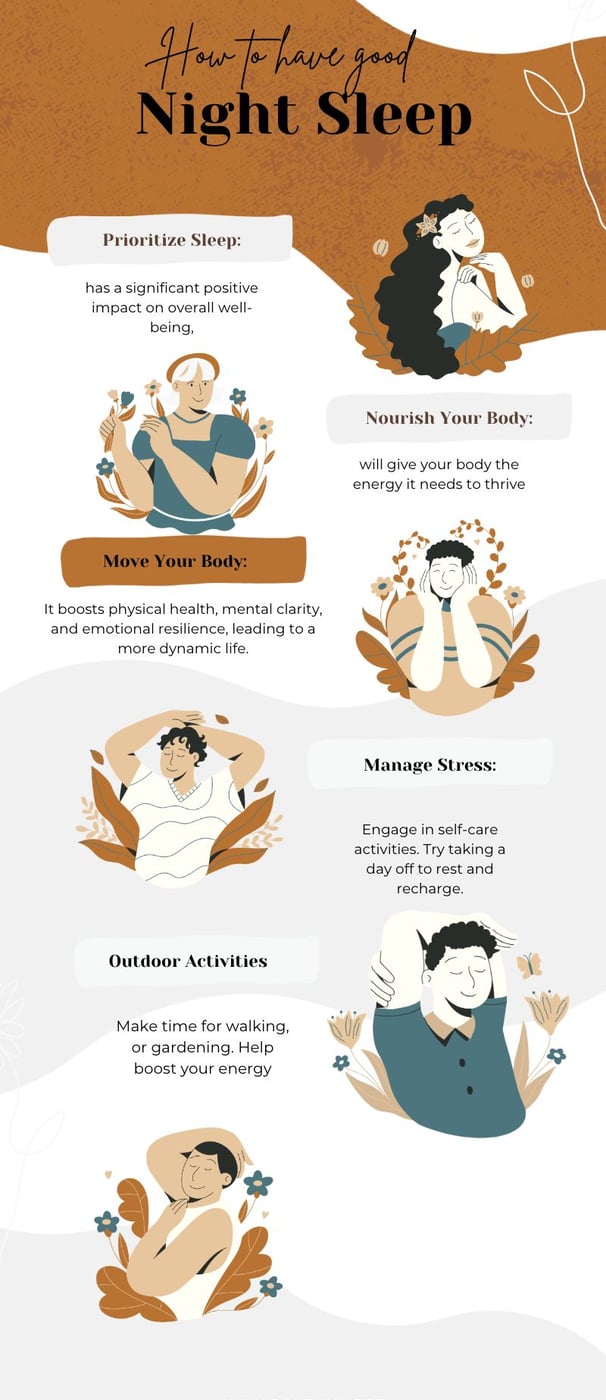Get tips on how to make your good night's sleep better.
Struggling to get a good night's sleep? Find practical tips, proper diets, proven strategies, and solutions for a good night's sleep and a happier, healthier you
PEACEFUL MIND
7 Tips of How to Overcome Trouble Getting Out of Bed in the Morning
I used to be that way. So you're not alone in this struggle. There are many ways to overcome this behavior. I recommend you keep track of your diet and daily routines in a journal. This will help you understand better how your body reacts.
Start by choosing the right meal.
Are you a fan of pizzas?
I know it's hard to resist, and you are not alone. But, I do know that instant fast food diets are not a smart choice. And even though strict eating plans may sound ridiculous, they give you results. Take lean proteins like salmon or chicken that energize you throughout the day.
Avoid junk food and unhealthful sweet drinks.
It's advisable to avoid processed snacks and sugary drinks, as they can leave you feeling lethargic and wanting more. Instead, take crunchy almonds, pistachios, walnuts, groves, or dried fruits.
Take a lot of water. If you are not a fan of plain water, then try a squeeze of lemon juice, juicy berries, or peppermint leaves. It helps you to clean up your body.
Your Gut: The Unsung Hero
Do you realize that your gut is called the "second brain"?
Like a little party inside of you, a healthy gut microbiome full of beneficial bacteria aids in immune system function, nutrient absorption, and digestion.
Research even suggests it can impact your mood and thinking! Avoid processed foods and refined sugars to keep your gut healthy.
You should eat a diet rich in prebiotics (fruits, vegetables, and whole grains) and probiotics (yogurt and kefir). When you fill your stomach with nutritious foods, you are setting the stage for maximum well-being, both inside and out!
These little changes in how you approach and think about food can have a big effect. By feeding your body from the inside out, you will be well on your way to laying the groundwork for a long and healthy life!
Prioritize Sleep: The Recharge Button for Your Body and Mind
I used to suffer from not getting an adequate amount of sleep. One of the reasons is that I stay up late, watch YouTube videos, or spend long hours in front of a computer screen, and by the time I am in sleep mode, that annoying alarm clock constantly disrupts me.
Prioritizing sleep isn't about laziness; it's about acknowledging that sleep is a fundamental pillar of ultimate health and a non-negotiable investment in your well-being.
The Importance of 6-7 Hours: While individual needs may vary slightly, most adults require 6-7 hours of quality sleep per night to function optimally. During sleep, our bodies repair and rejuvenate, our brains consolidate memories and process information, and our hormones are regulated.
Chronic sleep deprivation, on the other hand, wreaks havoc on our physical and mental health. It can weaken our immune system, increase our risk of chronic diseases, and impair our cognitive function, memory, and mood.
Prioritizing a good night's sleep is an investment in your overall health and well-being—a foundation for thriving, not just surviving.
Creating a Sleep Sanctuary: Creating a relaxing bedtime routine can significantly improve your sleep quality. Dim the lights, avoid screens for at least an hour before bed, and wind down with calming activities like reading a book or taking a warm bath.
Optimize your sleep environment by ensuring your bedroom is cool, dark, and quiet. Invest in a comfortable mattress and pillows, and create a sleep schedule that you stick to as much as possible, even on weekends.
Stress: The Sneaky Troublemaker
Stress triggers the release of hormones like cortisol, which can wreak havoc on your body. Over time, chronic stress can contribute to a whole host of health problems, like:
Increased risk of heart disease, stroke, and high blood pressure
weakened immune system, making you more susceptible to catching every bug that floats by
Digestive issues like ulcers and irritable bowel syndrome (not fun for anyone)
Anxiety and depression (which can make even the smallest things feel overwhelming)
Difficulty sleeping (because who can sleep when their brain feels like it's on overdrive?)
How to Manage Stress
Your Stress-Busting Toolkit:
You had a stressful day, and now you are so tired and want to sleep, but you can't.
Try these few tips and plan your day well:
Mindfulness: Think of mindfulness as a superpower that helps you become more aware of the present moment and detach from worries about the future or the past. Practicing meditation and deep breathing aids concentration on breath and body sensations, fostering tranquility and reducing stress.
Do Outdoor Activity: Spending time under sunlight, even just for a few minutes, will help reduce stress and boost mood.
Just take some time and enjoy the outdoors to lower cortisol, enhance cognition, and feel better.
Exercise: "Move It or Lose It (the Stress That Is): Exercise is a natural stress reliever. Physical activity releases endorphins, hormones that have mood-boosting and pain-relieving effects. Whether it's a brisk walk, gardening or a yoga session,
There are a lot of videos you can find on YouTube of exercise that you can enjoy and incorporate into your routine.
I hope these few tips help you overcome trouble getting out of bed in the mornings and feeling lethargic and uninspired.


Reputable Health and Wellness Websites and Organizations:
General Health and Wellness:
National Institutes of Health (NIH): https://www.nih.gov/ - Provides science-based information on a wide range of health topics.
Mayo Clinic: https://www.mayoclinic.org/ - Offers trustworthy and in-depth information on diseases, conditions, and wellness practices.
Centers for Disease Control and Prevention (CDC): https://www.cdc.gov/ - Provides reliable information on public health topics, including healthy living recommendations.
World Health Organization (WHO): https://www.who.int/ - Offers global health resources and information on various health topics.
Specific Health and Wellness Areas:
American Heart Association (AHA): https://www.heart.org/ - Focuses on heart health and provides resources for preventing and managing heart disease.
American Cancer Society: http://www.cancer.org/ - Offers information and support for cancer patients and caregivers.
American Diabetes Association (ADA): https://diabetes.org/ - Provides resources for managing diabetes and preventing complications.
National Sleep Foundation: https://www.sleepfoundation.org/ - Offers information about sleep disorders and healthy sleep habits.
MentalHealth.gov: https://www.samhsa.gov/ - A US government resource providing information and resources for mental health conditions.
Friendly reminder: When you search for health information online, it's crucial to choose reliable and trustworthy sources. You should look for websites with a clear mission statement, affiliations with reputable organizations, and content written by healthcare professionals.


